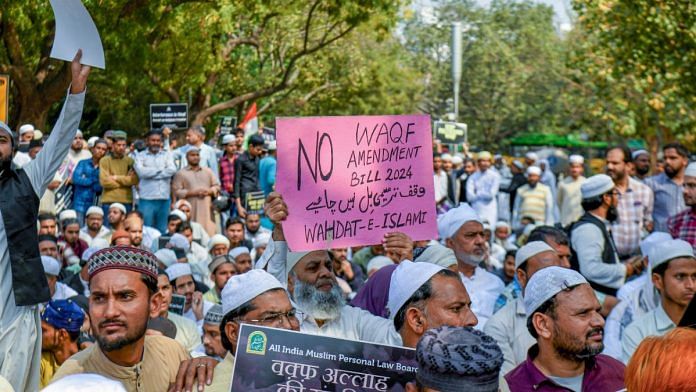Waqf by user: A legal recognition of the sacred
To grasp what has been lost, consider what was once accepted: under Section 40(2) of the Waqf Act, 1995, a property could be recognised as waqf not merely through formal dedication but through consistent and uninterrupted usage of the land for religious purposes. This was not a legal sleight of hand. It was rooted in both Islamic jurisprudence and India’s own case law.
The Bombay High Court, as far back as 1887, recognised that properties used continuously for pious purposes—even without a deed—could acquire sanctity in the eyes of the law. Justice John West eloquently stated that “long continued use for religious purposes itself constitutes appropriation to pious uses which the law will recognize and protect.” The Supreme Court in 1998 reaffirmed this in Sayyed Ali v. Andhra Pradesh Wakf Board, with Justice Hidayatullah observing that “dedication may be inferred from long and continuous use.”
This was not just a legal acknowledgment; it was a constitutional accommodation of history. The ‘waqf by user’ doctrine was a subtle recognition of the disruptions wrought by colonisation, Partition, and destruction of records. In many cases, Muslim communities—especially in rural and semi-urban India—retained the right to religious practice on properties even when the land documents were lost, stolen, or never created. In such cases, the ‘user’ became the archive. Practice became the proof.
The 2025 repeal: A bureaucratisation of the sacred
The 2025 amendment ends this understanding. With a stroke of the legislative pen, ‘waqf by user’ has been rendered void. The law now insists: if it isn’t in the registry, it isn’t waqf.
This represents a tectonic shift in how religious property is conceptualised. Under classical Islamic law, niyyat (intention) and istimrār (continuity of use) are sufficient to render a property sacred. But in the post-2025 legal landscape, sanctity must now be state-certified. The mosque in your lane, used for generations but lacking title documents, is no longer protected as waqf unless the state recognises it as such.
This is more than a procedural change—it is an epistemological rupture. The state, through the amendment, assumes the final word on what constitutes religious property, prioritising bureaucratic documentation over lived reality. The law no longer discovers waqf through community practice; it now creates it through statutory fiat.
Also read: Removal of Section 40 isn’t an attack on Waqf Boards. It’s a much-needed course correction
‘Interventionist secularism’ and the paradox of pluralism
This shift lays bare an enduring paradox in India’s constitutional secularism. As political theorist Rajeev Bhargava has argued, India has long practiced “principled distance”—a model of secularism that does not draw a rigid wall between state and religion but seeks to balance accommodation and regulation. The repeal of ‘waqf by user’ tilts this balance decisively toward regulation.
What’s at stake here is not just Muslim property rights but the very idea of how India manages its religious diversity. When the state dismisses usage as insufficient proof, it is essentially rejecting an entire epistemology—one that views community memory and practice as valid sources of legitimacy. The law now treats religious recognition as a top-down process, not a bottom-up reality.
While the government has offered a prospective safeguard—ensuring that existing waqf classifications are preserved—the future is left uncertain. According to government records cited by the BBC, there are 402,000 waqf properties classified as ‘waqf by user’, many of which have been in continuous religious use since before 1947. These are not post-hoc fabrications, but legacy claims sustained over generations by communities with little access to legal title systems. The compromise, while politically expedient, still risks erasing vast segments of India’s religious mosaic.
When the state becomes the arbiter of the sacred
At a deeper level, the amendment poses a critical question: Should the state possess unilateral authority to determine what counts as sacred? In a truly plural republic, shouldn’t the lived experience of religious communities also count as evidence—perhaps even as expertise?
This is not a debate limited to the Muslim community. If religious usage is no longer enough for Muslims to claim waqf, should not Hindu institutions—many of which operate without formalised title deeds or are managed through hereditary trusteeship—be subject to the same scrutiny?
During the preliminary hearings on the Waqf (Amendment) Act, Chief Justice Sanjiv Khanna highlighted the inconsistent application of secular principles, asking why members of one faith are allowed on another community’s religious boards and whether similar standards apply across all faiths. This underscores a key point: if the state demands modern proof or governance norms from one religious group, it must do so uniformly; otherwise, secularism risks becoming a selective, rather than universal, principle.
Also read: 1995 Waqf Act balanced Islamic principles and Indian law. Amendment Bill shifts the scales
Reimagining legal pluralism
Ultimately, the demise of ‘waqf by user’ is not merely about land. It is about memory. It is about whether the law can see what the community sees. Whether the sacred can survive in a spreadsheet. Whether a plural republic can trust its citizens to define the sacred for themselves.
This episode is a cautionary tale in the perils of bureaucratic overreach. In seeking administrative clarity, the law may have sacrificed cultural sensitivity. In demanding formal proof, it may have denied informal legitimacy. In its pursuit of modernisation, it may have deepened alienation.
The Supreme Court now holds the pen that will finish this chapter. Whether it chooses to uphold the amendment or carve out constitutional safeguards, the judgment will echo far beyond courtrooms and clerks. It will speak to the soul of Indian secularism—and whether that soul is expansive enough to hold both paper and prayer.
Yadul Krishna is a policy economist and a legal fellow at Governance Innovation Labs. He tweets @Yadul_Krishna. Ashraf Nehal is a South Asia analyst and columnist based out of London. He tweets @ashrafnehal19.
Views are personal.
(Edited by Aamaan Alam Khan)
var ytflag = 0;
var myListener = function() {
document.removeEventListener(‘mousemove’, myListener, false);
lazyloadmyframes();
};
document.addEventListener(‘mousemove’, myListener, false);
window.addEventListener(‘scroll’, function() {
if (ytflag == 0) {
lazyloadmyframes();
ytflag = 1;
}
});
function lazyloadmyframes() {
var ytv = document.getElementsByClassName(“klazyiframe”);
for (var i = 0; i < ytv.length; i++) {
ytv[i].src = ytv[i].getAttribute('data-src');
}
}








